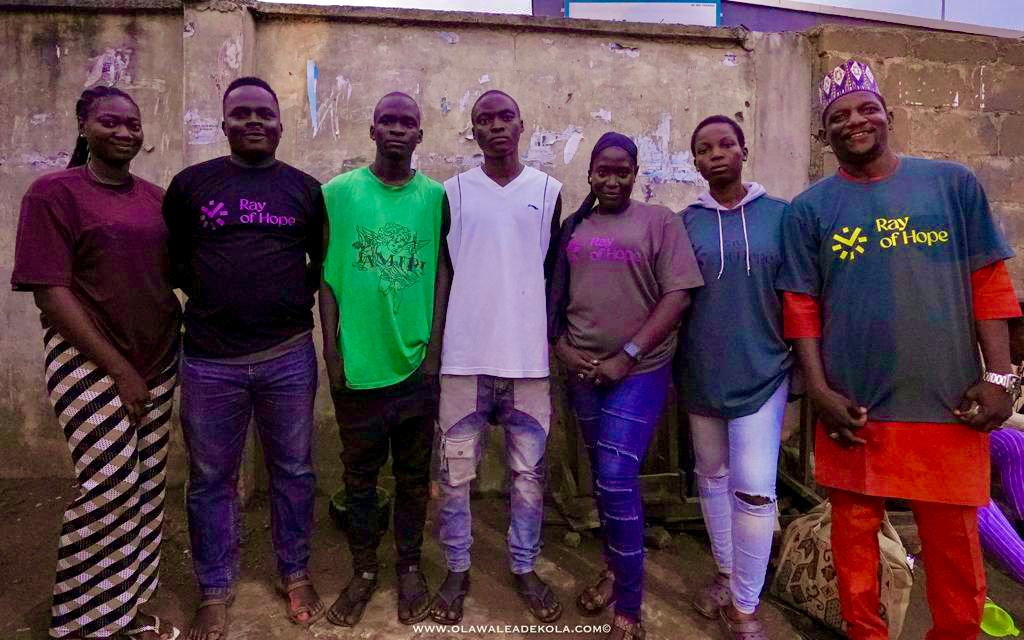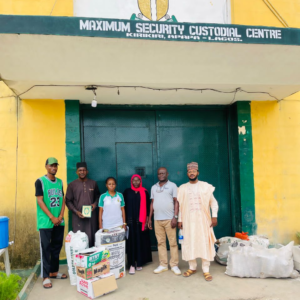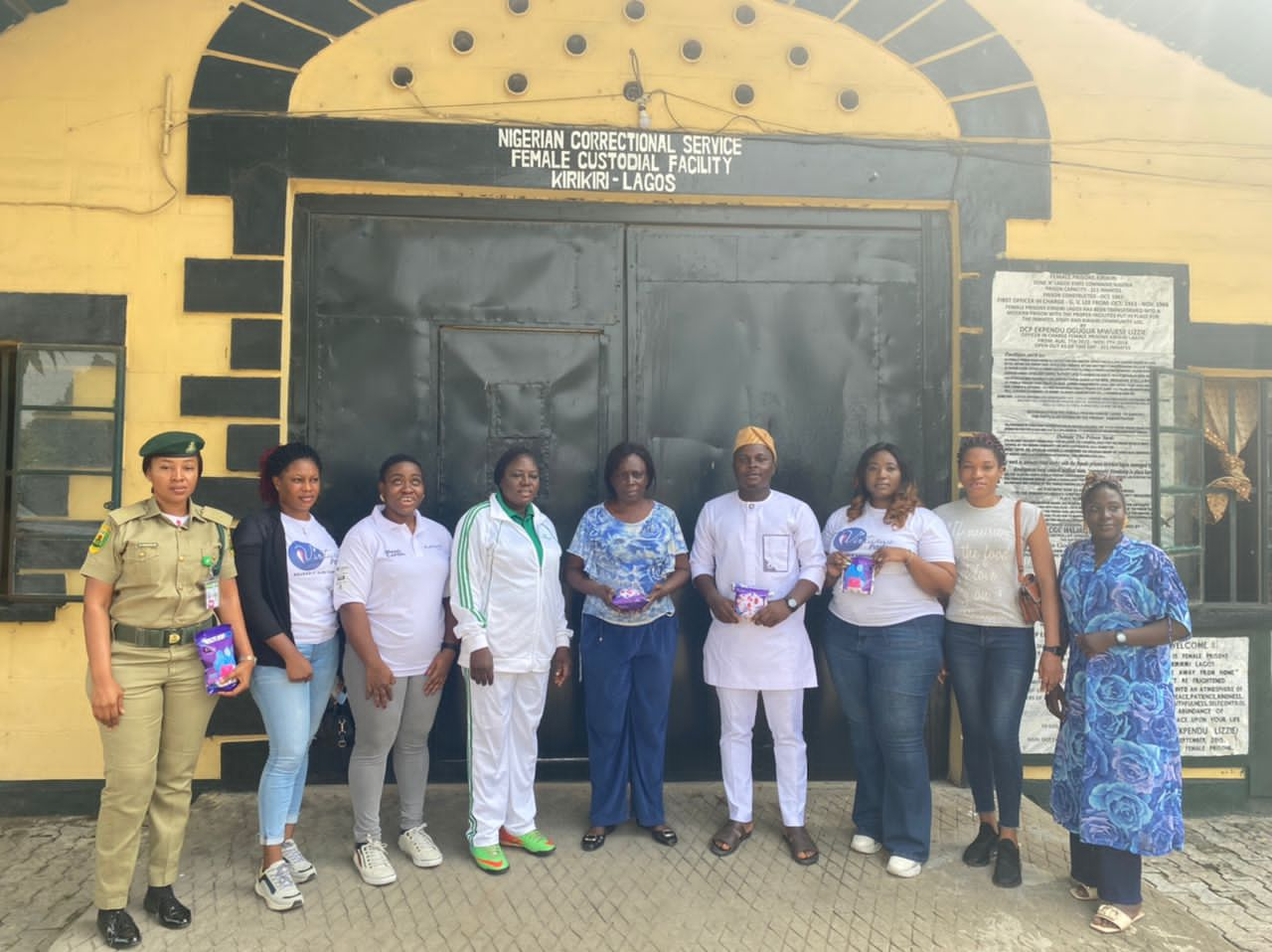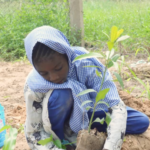In June 2008, Kazeem found himself caught in a police investigation and was summarily rounded up by operatives of the now-defunct SARS unit. Not until he appeared in a courtroom did he realise that he was being tried for attempted robbery. His mother, a street sweeper, struggled to secure bail for her son as his case got stuck in a loop of bureaucratic delays. Months bled into years. Ten years later, he was granted bail, but the lawyer tasked with his case did not inform him, and Kazeem continued in unconstitutional detention.
During a prison visit in the summer of 2022, a team of social-service advocates heard about Kazeem’s unfair detention and promptly took up the case. A lawyer was soon arranged, together with the necessary paperwork to secure his release. By July 2024, after 17 years behind bars, Kazeem walked freely into the harsh Lagos sunlight.
The group that facilitated Kazeem’s release belonged to the Ray of Hope Prison Outreach, founded by Stephen Ogunyinka and Hassana Nurudeen in 2022. The organisation, which is focused on prison welfare initiatives, raises awareness for prison reforms and advocates for the rights of unjustly imprisoned people like Kazeem.

Since it became established, Ray of Hope has processed the release of more than a dozen inmates wrongfully convicted from many different prisons across the country, including a 16-year-old teenager that was wrongfully arrested and remanded in Agodi Prison in Ibadan.
“There are so many minors in adult prisons,” said Hassana in a voice tinged with frustration. “When we first saw him, he was just a small, tiny boy,” she noted, referring to the teenager. “You look at him and think, How could someone like this end up here?“
Although born into a Muslim family in the city of Lagos, Hassana Nurudeen knew a life shaped by Christian values of love and selflessness. After her father disappeared for years, her mother struggled with the responsibility of caring for Hassana and her three siblings. Moved with compassion, a Christian neighbour, fondly called Grandma Ajanaku, took the children under her wing and paid for their Islamic education. “She shaped us, me and my siblings. She was just a selfless soul,” Hassana emphasised.
Given the religious differences between them, Grandma’s noble gesture to raise kids from a “Hausa Muslim family” was met with criticisms from other neighbours, who questioned her motives. “Why are you helping Hausa people?” Hassana recalled them asking. “Why don’t you help your own?” Responding with calm, Grandma would say, “I’m doing what Jesus asked me to do.” Despite the backlash, Grandma Ajanaku never wavered in her kindness
In 2003, Hassana’s twin sister, Hussaina, had a severe accident. Despite her critical state of health, many of the hospitals they visited would not attend to her, turning the family away. Grandma promptly rose to the occasion upon hearing the news, leveraging her connections and ensuring that Hussaina was eventually admitted for urgent medical care. Looking back at that memory, Hassana wondered how her family would have managed the dire situation without Grandma’s intervention.
“She just did what was right, and that’s a lesson I carry with me every day,” Hassana said, highlighting Grandma’s profound influence on her work today.
These days, whether in her outreach to prison inmates or in her Internet crusade for victims of unjust convictions, Hassana draws heavily on those Christian values of love, compassion and selflessness that she imbibed from Grandma Ajanaku.
In 2020, her values were put to the test. Chidozie Ajokuji, a Christian family friend who was nicknamed Junior, had been arrested alongside others during a police raid on a friend’s house in some part of Lagos, where he had been charging his phone. For more than four years, Junior languished in detention at the KiriKiri Prisons, awaiting trial.
Even more damaging was that Junior’s lawyer seemed uncommitted to the case, often failing to appear at court. Seeing what an unwitting victim of circumstances Junior was, Hassana was determined to help her childhood friend secure justice. She turned to X (formerly Twitter) and broadcast Junior’s unfortunate story to her 1000-odd followers with the aim of stirring up attention to the injustice.
Her tweet garnered quick traction. Family relatives reached out with similar heartrending stories of unlawful convictions. A lawyer offered his free services and began to push for early court dates in order to hasten the case. But the process to get fair justice seemed long and arduous. The judge was often absent, and the case was often adjourned as a result. The slow pace of the court proceedings, amidst a prolonged pandemic lockdown, made it increasingly difficult to secure justice for Junior. By 2023, the case had been heard only twice since the previous year.
Hassana’s prison visits revealed not only illegal detentions but also unfair trials, as in the case of the man who was imprisoned for stealing pieces of chicken. The lack of empathy and the gross inefficiencies that condemned hapless Nigerians to years of sorrow and neglect highlighted a system in dire need of reforms. Policemen assault fashionable young Nigerians with accusations of cybercrime and extort money from them. In 2020, young Nigerians flooded the street in droves protesting against police brutality in what is now referred to as the EndSARS protests. “The prisons are overcrowded, the judges are swamped, and the police are corrupt,” she bemoaned. “It all starts with those in positions of power doing their jobs honestly and with empathy.”
As Hassana learnt from her experience with Junior’s case, justice in Nigeria was an exclusive preserve of the wealthy. This epiphany would inspire her life work to address the problem of delayed justice suffered by the unfortunate poor. She was not alone. Stephen Ogunyinka had been looking to develop prison welfare initiatives. In 2022, the duo connected over X and founded Ray of Hope Prison Outreach shortly afterwards, calling on volunteers to join their cause.
In the years since then, Ray of Hope has enjoyed ample support from X, a social network otherwise notorious for trolling and misinformation. Donors on social media help to raise money, sometimes millions of naira, to support life-threatening cases, such as in the case of 14-year-old Fathia Muibi, who suffered from intraocular melanomas (cancer of the eyes). “It’s people like these who remind me that humanity isn’t dead,” Hassana remarked of the overwhelming public support.
Despite the funding raised for her treatment, Muibi later died as the cancer had spread into other parts of her body by the time the group found her.
For Kazeem, 17 years in detention had wrought profound changes on not only his psyche but also his family. His wife had passed away during his years in detention; his son, a dispatch rider, barely knew his father. Nearly 80 years of age, his mother had sold her property in a desperate bid to secure her son’s release. “Life has passed him by,” she bemoaned, reflecting on her son’s tragic circumstances. Indeed, life for Kazeem was markedly different from the world before his incarceration.
Reintegrating into society was certainly no mean task, but Ray of Hope was determined. “We can’t wait for compensation that may never come,” Hassana said. “We have to figure out how to help him now.” A GoFundMe campaign was soon launched, and more than a million naira was raised.
At Ray of Hope, rehabilitation typically involves skills acquisition and business support. Ex-inmates are set up with fashion shops or offered barber’s kits to rebuild their lives. Most pivotal of all is therapy to help the inmates manage the ensuing stigmatisation effectively.
Its outreach extends beyond legal aid for prison inmates. Last Ramadan, volunteers for the network visited prisons across Lagos with food supplies for fasting inmates, raising the tally of material support to $4000 so far.

For teenagers caught in a conflict with the law, the stigma can sometimes be insurmountable. After the group worked to release the 16-year-old teenager from Agudi Prison, Hassana and the rest of the group launched a crowdfunding campaign that would also help reintegrate the lad into society. Family members had broken ties with him completely. His aunt was reluctant to take him back. However, she believed that, if given adequate support and care, the teenager could rebuild his life.
Ray of Hope’s mission skates over a myriad of hurdles. Limited funding makes it challenging to provide consistent support. Most funds are raised within small circles, with little external assistance. Efforts to secure funding to help decongest the prisons, for example, are often met with demands for bribes from wardens, further hindering its mission of fair justice.
Dishonesty is yet another challenge. Hassana recalled a case involving her friend from primary school, who lied about the reasons for his imprisonment, leading to further complications, and the difficulty of handling such situations is a major hurdle for the organisation.
Weeks after the 16-year-old lad was released from prison, Hassana returned to the rehabilitation shelter to find that he had absconded. The organisation has since launched a search party to find him. Yet keeping track of the progress of these ex-inmates, she admitted, can be challenging. Despite their promises to stay in touch, many of the ex-inmates simply disappear without a trace.
Hassana recounted instances of police assaults and intimidation during her early prison visits, highlighting the thick skin she’s grown as a result. “You can’t intimidate me anymore. I’m here to help, and if you’re too blind to see that, it’s your loss.”
Where NGOs are limited in their solutions, the government holds a critical role in reforming the prison system
She envisions Ray of Hope growing to international acclaim in the years to come. Among the foundation’s aspirations are a school for inmates and a rehabilitation shelter for ex-inmates that will “give them the love they didn’t get at home or in prison,” she said.
Hassana’s passion for justice is driven by not only her Christian upbringing but also her Islamic faith and its teachings of compassion and service to humanity. “Religion inspires me to do more,” she noted. “God is going to look at how many lives you touched, how many people you helped.”
Her journey from a child embraced by a Christian neighbour to a devout Muslim advocate for justice reflects a profound intersection of faith, compassion and resilience.
“I don’t want anything from Ray of Hope,” she said. “Hassana was a great person, Hassana touched lives; Hassana helped people. That’s all I want to be remembered for—great things.”
In 2008, Mr. Kazeem was wrongfully detained by the now-defunct SARS unit and spent 17 years in unconstitutional detention before being released in 2024 through the efforts of the Ray of Hope Prison Outreach. Founded by Stephen Ogunyinka and Hassana Nurudeen, this organization advocates for prison reforms and fights for the rights of unjustly imprisoned individuals. Kazeem's case highlights the systemic issues within Nigeria’s justice system, including bureaucratic delays and corrupt practices.
Hassana Nurudeen, inspired by her Christian upbringing from a compassionate neighbor despite being from a Muslim family, channels her values of love and selflessness into advocating for justice. Her organization uses social media to raise funds and awareness, successfully aiding numerous individuals like a 16-year-old boy from Agodi Prison and raising substantial support for medical cases. Despite the challenges of limited funding, corruption, and dishonesty, Ray of Hope continues to provide rehabilitation services, aiming to reintegrate ex-inmates into society. Hassana’s faith-driven passion for justice reflects her commitment to service and making a tangible difference in people's lives.






